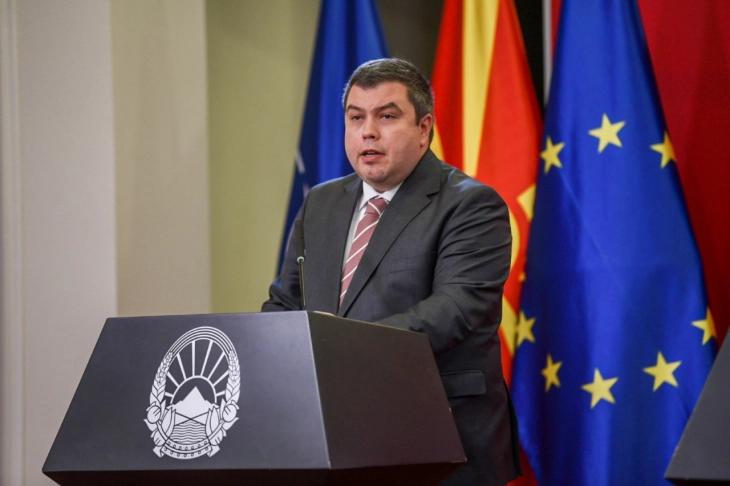Deputy PM Marichikj to helm the team tasked with negotiating with the EU

Skopje, 5 September 2022 (MIA) - The government today at a session passed a decision on establishing a structure for North Macedonia's accession negotiations with the EU. In 2019, the government had passed a set of measures establishing a mechanism, but there was a need to change it later due to several reasons. The enlargement process has changed and the EU membership criteria are becoming stricter especially after the introduction of the revised methodology on the accession negotiations in 2020, Deputy Prime Minister for European Affairs Bojan Marichikj said Monday.
Speaking at a news conference, Marichikj said there is no model of experiences from the countries that have negotiated or are still in negotiations because this is the first time that the methodology will be put into use.
"The new methodology introduces more political accession negotiations that will raise the whole process at a higher political level in all stages of the negotiations. Under today's decision, we decided on a new structure that simplifies this mechanism making it hierarchy-wise more functional, more efficient and more effective," he said adding he had been appointed as chief negotiator with Drita Abdiu Halili, a state secretary for European affairs, being appointed as his deputy.
The negotiating structure, in addition to a chief negotiator and a deputy, also includes a negotiations committee, chaired by the government and PM Dimitar Kovachevski, four deputy premiers, the foreign minister and the finance minister. It also includes a state delegation for negotiations, helmed by Foreign Minister Bujar Osmani as head of the delegation.
The negotiating structure also includes a negotiations group made up of a chief economist, chief legal expert and a chief anti-corruption expert. A working committee on European integration and working groups for accession talks, as auxiliary bodies divided into clusters, three areas and 33 chapters, have been also set up. They will take part in preparing analyses on the level of alignment of the national legislation with the EU's and draft-negotiating positions.
The Secretariat for European Affairs will serve as the only coordination point given the authorization it has as regulated by law.
"Due to the importance and the role of Parliament, its decision will be defined by a mutual agreement also defining the role of the opposition. In the coming days, meetings with the chair of the National EU Integration Council are planned with which we are extending a hand to the opposition to engaged in this process as well," said Marichikj.
As regards the head of the state, he said that a mechanism for the way and dynamic to inform the President about the negotiations process will be additionally established.
The decision on the negotiations structure, according to the Deputy PM, also opens a way for the civil society to take part in the work of working groups, where the business community, scholars and local self-government units will also have a place.
"We've set the goal to conclude the EU negotiations by 2030. Our future is in the EU... A very dynamic period is ahead in which we will be addressing numerous aspects and issues. Only if we are sincere, we will implement the needed reforms efficiently to be prepared for the next stage - to open the clusters and the chapters," Marichikj to the news conference.







